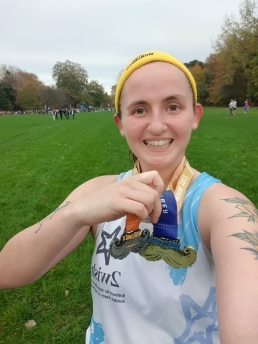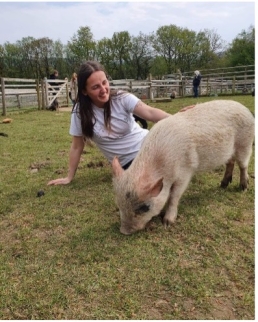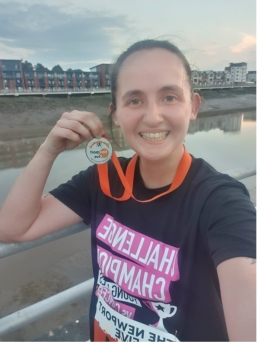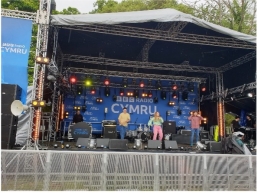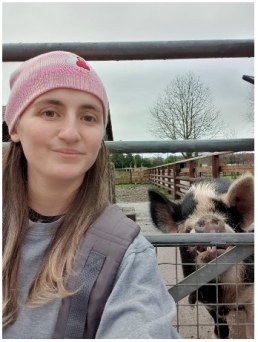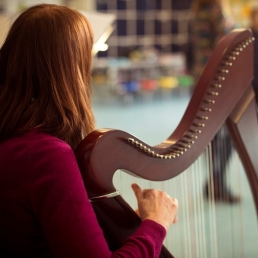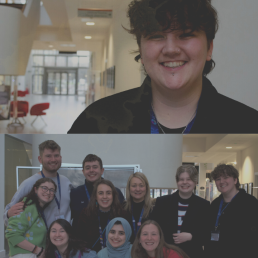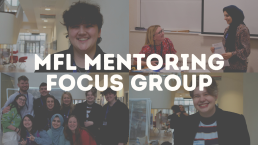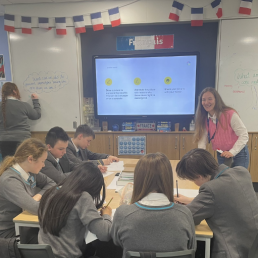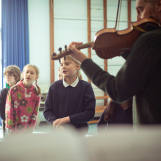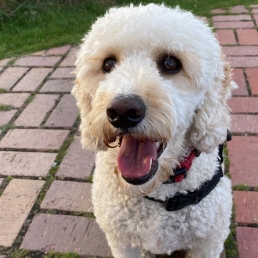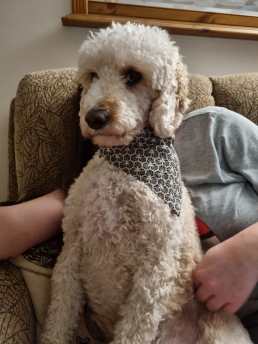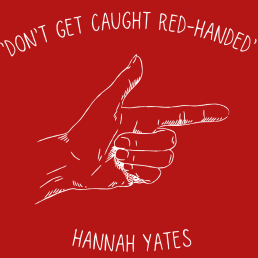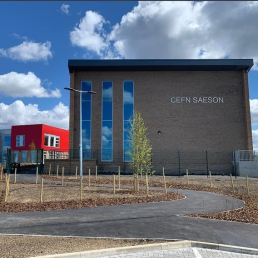Meet Greta!
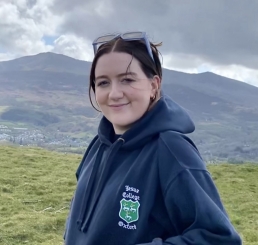
Hiya! My name’s Greta (she/her) and I’m a second year German and Linguistics student at Oxford University, but I’m from Cardiff originally.
People often don’t know exactly what Linguistics mean – it’s actually a science that focuses on the way that languages work! It involves studying things like how sounds are created and how they travel, how language works in your brain (creation and processing), how grammar differs across languages (words and sentences) and so much more! I love studying Linguistics because it gives me the chance to study languages from a scientific perspective*, which is so different from how people generally think about languages i.e. from a humanities* perspective.
Back when I was in school, I always thought about language learning as something you did in the classroom with either paper or digital copies of vocab* lists, which I found pretty boring if I’m being honest. I think it’s a real shame that something as exciting as learning a new language and culture can be limited to just long word lists! Language learning offers so much more than this, but I know that young people’s attitudes towards languages are often heavily influenced by the classroom teacher and their teaching style. I started to see another side to languages when I began learning German on my own at home. I was going to Germany in the summer to meet my cousins for the first time, so I decided to learn some German so I could try and speak with them in their mother tongue*.
My German language learning journey started when I received a German gift on my birthday (the Rocket Languages app). So, for 20 minutes every morning, when I was getting ready for school, I would listen to the ‘lessons’ on the app instead of listening to music. I learnt how to have simple, realistic, and useful conversations, and I found it so much easier to learn through listening and speaking, instead of reading and writing. I’d sometimes listen when I was out and about walking or even travelling on a bus – I must have looked a bit funny talking out loud to myself saying things like ‘Können Sie mir ein Restaurant in der Nähe empfehlen?’ (can you recommend a nearby restaurant?!). I really enjoyed learning in this interactive* and stress-free way, and I think I learnt the language a lot quicker because of this. I recommend everyone learns a language in this way, as the language you speak is, after all, a lot more natural.
My cousins really appreciated all my efforts learning German and we laughed a lot listening to some of the funny lessons together. My favourite lesson was ‘die Verlobung’ (the engagement)…
I never would have thought that I would be studying German in university all these years later, but I really did get bitten by the language learning bug! Being able to speak with my family in German was so exciting, and even ordering a strudel* in a cafe felt like a small victory to me!
I really enjoyed learning German and it actually made me realise that I wasn’t just interested in German language and culture, but rather how language works in broader terms, so this is what sparked my interest in linguistics. Linguistics doesn’t focus on any one language in particular, but rather on languages as a whole. This isn’t something that is offered as a subject in school, so I had to do lots of research before applying to study it in university.
I remember thinking that I wasn’t quite sure how it would work – how would it be possible to study every language in the world at the same time? I’ve since been amazed to learn how incredibly similar all human languages actually are!
I really didn’t expect that at all as I always remember being told that languages and cultures across the world were so different. But the truth is that all the world’s languages and cultures are much more alike than they are different. In terms of sound, there are only so many possible sounds that the mouth can produce, and they’re produced the same way around the world. Even grammatical structures follow certain rules as they’re hierarchical*. When traveling across the world, we often come across cultural practices* that are not so different from our own; music, performance, stories, poems, cooking and food, celebrations of love, storytelling and much more. Although the specific practices are different, the basic ideas are very similar. Having a rich identity and culture is a human thing, which belongs to us all. I find it incredibly exciting that we can learn more languages whilst drawing on the connections and the similarities between them. The ability to make connections between lives that seem, at first glance, so different from our own on the other side of the world, is absolutely amazing!
Learning about languages has changed the way I see the world around me, as well as the way I think; it’s definitely not something that is limited to a classroom or an essay. It’s meant that I’ve been able to broaden my mind to understand different structures and ideas, cultures and perspectives. It’s a never-ending journey, as there’s always more to learn, about German, about other languages I’m learning like Japanese and Ancient Greek, and even about my mother tongue, Welsh!

Here’s a photo from my trip to Japan, where I was lucky enough to experience a new culture and meet lifelong friends.
Learning a language is an exciting and colourful journey (which is sometimes a literal journey), which has not only changed the way I think, but also opened doors to my future.
I’m tired of the frustrating idea that language only leads to a career in teaching or Translation. Whilst there is no doubt that these are great careers, it is completely wrong to suggest that these are the only careers available to those that study languages, when there are all kinds of rich and varied opportunities on offer. Languages are central and relevant to politics, business, health, technology, law, philosophy, climate change and so many more sectors. In the future, I’m really keen to work on linguistic research in the development of AI. This is a vast and growing field, and language plays an important role in it.
Language learning offers endless possibilities because languages encompass everything that makes us human; our way of thinking, our way of communicating, our identity and learning about this is a never-ending journey.

· Perspective – point of view
· Humanities – learning about human culture like literature, history, art, music and philosophy
· Vocab – short for vocabulary, meaning words
· Mother tongue – the language you grow up speaking from childhood
· Interactive – communication between people or flow of information between a device and a person
· Strudel – a dessert made out of thin pastry filled with fruit
· Hierarchical – people/ things arranged in order based on their importance
· Cultural practices – behaviours or values shared within a community
Meet Non!
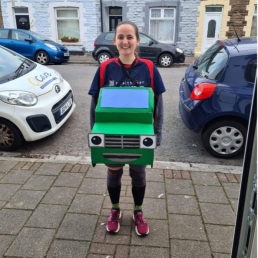
About me
Helo, Non ydw i, shwmae!
I’m Non, a 30-year-old student from Cardiff. When I finished my undergraduate degree in Experimental Psychology many years ago, I confidently said that whilst I still wanted to be curious and learn many new things, I was done with studying. Happily, I was wrong, and have since gained a master’s degree in Professional Translation Studies, a Postgraduate Certificate in Interpreting, and several other *professional development certificates. I’m so glad that I was wrong and *premature in *declaring the end of my journey in education! Every one of the courses I’ve studied has been *enriching and I’ve gained skills, knowledge, experience, and confidence in my abilities along the way. I’ve also been able to take advantage of opportunities which may not have otherwise come my way. It’s obviously good to be wrong sometimes!
I’m currently halfway through my PhD which is investigating the ways in which court *interpreters make changes when *interpreting between two languages, and how these changes affect the jury’s opinion of the defendant*. It’s rare that the same thing can be said in exactly the same way in two different languages. Also, interpreters work in real time, out loud, with no easy way to ‘edit’ their interpretation, so changes are always likely! I’m *fascinated by the changes that occur during translation and interpretation, the relationships between language, culture, and power and the often-ignored *interpersonal nature of the interpreter’s role. I hope that my current research will have real world impact and help people to understand how best to help the court interpreter in their role.
Outside of my hectic life as a PhD student, I’m also a mother to two fantastic children and wife to a fabulous husband. I sing in a band and have a small business selling greetings cards with images of pigs and dogs on them! I’m also a keen (some would say obsessive) runner and swimmer and enjoy entering races, especially 10k which is my preferred distance. I sometimes race in costume too! My favourite animals are pigs and an interesting fact that ties together my love of running and my love of pigs, is that the pig’s reputation as lazy is completely unfair. In fact, pigs can run a 6-minute mile and, on a very, very good day with a flat track, mild weather, and plenty of sleep the night before, so can I!
Languages and me: Welsh
I learned Welsh alongside English at home and didn’t truly appreciate the value of my *bilingualism until I moved away to university. I went to a Welsh language Primary and Secondary school where I was a member of the Urdd, went on residential trips to Glanllyn and Llangrannog and competed in the Eisteddfod. We learned ‘dawnsio gwerin’ in Primary School PE classes and enjoyed a good Twmpath. In primary school we explored the Mabinogion; Welsh folktales and traditions such as the Mari Lwyd.
We also learned a lot about Welsh history and how our national language was treated as a *nuisance and something that should to be stamped out. More recently, I was horrified to hear about the ‘Welsh Not’ and the changing of Welsh surnames, such as ‘Ap Rhys’ to the more ‘acceptable’ English version ‘Price’. Perhaps it was these early experiences that sparked my interest as an adult in the relationships between culture, language, and power.
Moving from Cardiff to Bristol for university wasn’t an enormous culture shock, but it still opened my eyes to some things I’d taken for granted, such as bilingual signs and free medical prescriptions! I had a very international and *intercultural group of friends, yet I noticed that some people would say negative things about Wales and Welsh that I was sure they wouldn’t say about other languages. This angered me. I think I experienced that *cliché of not knowing what you have until you’re missing it – at home I could speak Welsh or English and I found myself missing Welsh conversations.
I also noticed more anti-Welsh language bias* in my old workplace; colleagues used to say that translating documents into Welsh was ‘a waste of time, because everyone understands English so it should all be in English’. This of course ignores the many people who speak Welsh at home, at work, and in their social circles. Let alone anyone who would just rather read a document in Welsh instead of English! Facing anti-Welsh attitudes made me feel closer to and more protective of my identity as a Welsh speaker. Sometimes we need something to rebel* against in life!
In my first couple of workplaces after university, I was often asked to translate simple things and quickly found that I really enjoyed it. So much so that my last job was as a translator. I was then offered a *funded opportunity to study for a master’s degree and during that degree I *tried my hand at interpreting and absolutely loved it! It was hard working full time and studying for my master’s part time, but it was well worth it – I think the best part might have been bringing my then 6-week-old son to a seminar with me!
Both my son and daughter attend Welsh language schools and I’m very proud that they will also grow up bilingual. Outside of school they are also *immersed in Welsh culture; we read Welsh and English books at home, watch Cyw on tv and enjoy going to Tafwyl and to The Egin. My husband is from Newcastle and spoke only English before meeting me, but he now enjoys watching Pobol y Cwm and Rownd a Rownd with the subtitles on and knows a few important Welsh words such as *cwrw!
Languages and me: GCSE French
I chose to study French at GCSE, despite all the jokes about my name….it was funny the first time someone pointed it out, honestly! I enjoyed learning a new language and we were lucky to have a very creative teacher who had us singing songs to help us learn different things such as the alphabet.
A creative way that I approached learning French was by watching the Champions League matches on French TV channels to pick up words from the commentary! It was actually a good way to get used to different accents and was easy to follow because I could also see what was going on too. I also used to tell my Mum that watching football was ‘revising!’ As much as I joke, this really was a useful and enjoyable thing to do alongside more traditional revision methods.
I considered taking French for A-level and sometimes regret that I didn’t, as I’ve forgotten quite a lot of what I learnt at GCSE. However, I chose to study 5 A-levels back then and couldn’t squeeze in another!
I actually thought that I’d forgotten all of my French but was pleasantly surprised when I went to university and one of my housemates was Moroccan. His first language was Arabic, second French and third English and whilst he could get by in English, he found speaking in his third language all day exhausting. He used to bring French-speaking friends over to our house and I found that I could understand almost all of what they said, and they could understand much more English than they could speak. This meant that because of the understanding I’d developed studying French GCSE, and despite having lost almost all of my speaking ability (or maybe the confidence to speak), I could hang out with this group of French and North African students in our kitchen and enjoy each other’s company despite what could be considered a *language barrier.
My Student Life and Future Me
My student life is a little unusual in that I study at Aberystwyth University but am a distance learner, as I live in Cardiff with my family. I generally work from home and most of my learning is *asynchronous which means that I can choose my own hours and fit them around school hours, my husband’s job and my own needs to run and swim as often as possible. This is an enormous *privilege but equally is something that should be treated with great care; it takes a lot of *discipline to make time for work when you can do your work at any time. Also, working from home requires you to have clear boundaries so that you avoid always being in ‘work mode’.
After I complete my PhD and become Dr Non, I hope to find a job in research; ideally as an academic member of staff at a university. I also wish to keep pet pigs!
British Council’s Cerdd Iaith – Language of Music
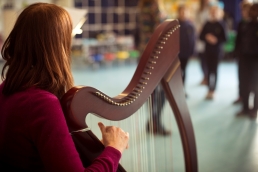
Back to Cerdd Iaith! It’s worth saying that the British Council is passionate about people learning international languages; we recognise the importance of languages in building friendships and empathy between cultures and we believe that young people having the ability to speak and understand international languages is essential to this. We also know that this leads to increased trust, engagement, and trade between and within societies.
And so, with the advent of the new curriculum in Wales, and its stated aim to provide young people with curiosity and enthusiasm, we aim to create the foundations for a lifelong interest in the languages of Wales and the languages of the world. Therefore, we think now is just the right moment to create new Cerdd Iaith activities and to roll these out to as many schools in Wales as possible.
There are four main aspects to language learning, speaking, listening, reading, and writing – these are recognisable to many of you who will be reading! Cerdd Iaith starts with the idea that if you get speaking and listening right, then the motivation to investigate reading and writing will follow. Cerdd Iaith is aimed at upper primary school learners, years five and six, so that learners go into secondary school with a positive and confident approach to learning a new language.
There is something vital in the British Council’s approach and appetite for teaching international languages, coming together with the aims of the new Welsh curriculum, and then using the pillars of creative education to build this resource. Cerdd Iaith is based on encouraging learners to be independent enquirers, creative thinkers, reflective learners, team workers, and effective participants – what’s not to love?!
The Durham Commission on Creativity and Education was convened to look at how our education system and wider system of learning for learners can grow the capacity for creativity. The commission began by asking how creativity is experienced and valued in the world:
‘Creativity, of course, goes by many names. It may be called intuition, enquiry, or expression; for business, it may be described as innovation, invention, or entrepreneurship. In all areas of life, from the sciences and humanities to the arts, creativity is seen as the ability to think laterally and come up with imaginative solutions to problems, to work across disciplines or to enjoy constructive play’.
So how does this relate to language learning in the classroom and in particular, in relation to Cerdd Iaith? To take one example, Cerdd Iaith offers language learning (Spanish and Welsh) in the context of travelling to Patagonia. Learners are asked to think about the voyage of the Welsh settlers to Patagonia on their ship the Mimosa. The teacher asks them to imagine how the settlers would have felt and what they might have seen? Then they ask the learners to ‘become’ a frozen picture of something on the ship. The exercises encourage learners to use vocabulary learnt in a previous exercise while also exploring Welsh culture and history. They speak and hear Welsh and Spanish, while having fun and using their imaginations. In another exercise learners are asked to take it in turns to introduce themselves, and to state what they will be taking in their suitcase. They must then repeat, (remember) all the objects that the learners before them have said, in the right order, before they name their own object. They can create an action or gesture to go with their object which everyone must repeat. This is a memory game with context, one which places language in a real-life scenario. When we set rules for learners, such as those involved in playing a game, they often find it easier to be imaginative and free. The fact they had previously learnt new words and were being asked now to use them in the story, makes it easier and ‘encourages a deeper level of learning.
My next blog will explore some more aspects of the Cerdd Iaith resource, so keep a look out for the next in our series!
Meet... Poppy!
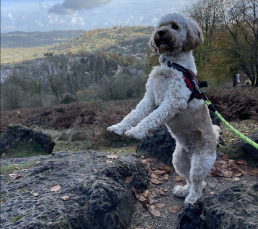
Shw’mae bawb! I’m Poppy, the second of MFL Mentoring’s canine co-working duo (first’s the worst, second’s the best right…?!). I’m Ellie’s younger and, I like to think, better-looking sister – well I have less of the poodle curl, so I get less twigs and mud stuck in my coat at least! If Ellie thinks she’s getting all the limelight for MFL Mentoring’s social media campaign, then she better think again…I’m not called Poppalicious for nothing!
I’m fortunate enough to be Becky Beckley’s right-hand woman and there’s nothing I like more than a 9am Teams call – if it starts without me, I have serious FOMO. It’s a noisy home with the Beckley boys keeping me on my toes, they like to play frisbee with me and hide the sprout (it’s the Christmas gift that keeps on giving…). They’re also partial to doing the conga with me which is an interesting sight… I may share a photo for you to enjoy but I’ll let the anticipation build first!
When Becky is hard at the homeworking at the kitchen desk I either like to take a long snooze or to have fun in the back garden, there are so many birds and squirrels to chase, I was even lucky enough to find a dead rat once…. oops maybe Becky would prefer me not to mention that!
I’m often unsure as to whether I want to be outside or inside and I think it’s fair to say that Becky sometimes gets more than a little annoyed, as I often interrupt her pawing at the door to go out, or come back in. Her absolute pet hate is when I paw the door to come back in and then I run away when she answers the door (cue evil laughter…). I wonder what she finds worse, the fact that I’ve disturbed her and she has to walk over to open the door, or the fact that she’s had to open the door for me and has consequently let out what little heat there is in the house in a cost-of-living crisis (cue guilty face…).
Anyway, all this got me thinking about what you would call this ‘game’ – the knocking on the door (or pawing – or even scratching in my case on a naughty day) and running away. Where Becky grew up in South Wales, they called it ‘cherry knocking’, but I believe it has many different names depending on the area where you live (anyone heard of Knock, Knock, Ginger/Ding Dong Ditch or Nicky Nicky Nine Doors?). Becky tells me I’m lucky I’m not human because if I were a human, I’d be breaking the law as cherry knocking is illegal under the 1839 law… it really is a dog’s life!
I’d love to hear your take on this so let me know what you call this over on Twitter/Instagram – join me there!
Learn something new today, take a look at this Knock, Knock, Ginger: The History of the Ding-Dong-Ditch Prank – Professional Moron

MFL Mentoring Focus Group
Last month saw the MFL Mentoring team bringing together some of our amazing mentors to discuss their experiences with the project. It was a truly inspiring morning which left the team energized and enthused for planning the upcoming year.
We were so blown away (as always!) by our mentors and the insights they shared with us. With such a diverse group of mentors this year, the MFL Mentoring team wanted to highlight the range of experiences and perspectives of this wonderful group of people. As role models in their schools, we also felt that their life experiences and personal journeys naturally lended themselves to inspiring our community more broadly.
So, we thought, what better way to demonstrate the value of our project and its mission to spread cultural awareness than to celebrate our mentors and their diverse stories. Whatever race, gender, sexuality, religion, or community you belong to – MFL Mentoring welcomes and celebrates you!
The focus group was a perfect opportunity for our mentors to reflect on their mentoring journey, the highs and the lows. Some of the key things that mentors shared with us were:
“It’s amazing to have a community that understands the importance and the beauty of languages and spread it all over. It’s like lighting a candle in darkness, brightening minds…”
– Basma, Swansea University
“I have realised how important it is to be a role model for the mentees and encourage a passion for languages. I could have benefitted massively from this.”
– Elliott, Cardiff University
“With the current negative narrative around trans rights, it definitely feels good to have a community that not only respects my identity but actively encourages me to stand up for myself, use my name, use my pronouns, and be myself when I work.”
– Jules, Swansea University
“Diversity is massively represented in the mentors. The way the sessions are designed inherently promotes cultural exchange.”
– Dom, Cardiff University
“I have been recommending this to other international students. It is an eye-opening experience, including the mentoring and seeing how the project team works, and as a way to promote intercultural communication and connections by using ourselves as the instrument.”
– Zhen Ni, Cardiff University
The way in which the project brings our mentors together to celebrate who they are, unapologetically, is one of the most amazing things about MFL Mentoring. There is pride and hope invested in our mentors as they share their stories with young learners across Wales, and they may just be the role models that our learners have been looking for!
It was such a privilege for the team to be a part of the fantastic discussions and reflections that took place and, cliched as it sounds, we were genuinely touched by the ‘journey’ that our students had experienced as mentors. The mentors’ desire to show respect for each other, to learn from each other, but also to do better for each other was truly inspiring. To all of our mentors, from the bottom of our hearts, a huge diolch yn fawr iawn for trusting us with your stories!
School profile: Tonyrefail Community School
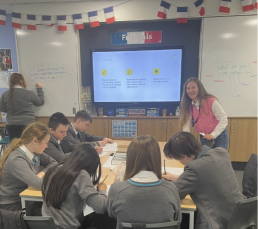
Lisa Humpries, Tonyrefail Community School
Medium: English
Location: Tonyrefail
Languages: French, Spanish
When looking at how to raise the profile of IL amongst our Year 9 learners, we felt it was important to focus on the key aspects that the majority of learners are looking for when deciding their option choices; enjoyment of lessons, perceived competence in the subject, and perceived relevance of the subject. As a result, the following strategies are currently being implemented to improve learners’ attitudes in these crucial aspects.
EPI – ‘Contified’ Scheme of Learning
The introduction of EPI within the department has made a substantial impact in terms of the enjoyment Year 9 experience during IL lessons and the sense of accomplishment that they feel in each and every lesson. The abundance of varied activities introduced has given all learners multiple opportunities to understand and then produce high-frequency target chunks, providing them with ready-made building blocks that they are able to use confidently and accurately. This has really helped build the confidence of our learners and allows them to see our subject as something that they can make clear progress in. In particular, the competitive edge to many of our speaking activities (sentence stealers/battleships/mind reader etc.) has led to learners being willing to speak more enthusiastically which has really made a difference in how successfully they feel they can communicate in the target language.
PenPal Opportunties
We are also lucky enough to have built a strong link with a school in Paris over the last five years and as a result, two of our year nine classes this year have had the opportunity to be matched up with a French Pen Pal. Learners see this as an excellent way of using their language knowledge for authentic purposes and they respond extremely well to receiving a letter of their own from their new companion. Our letters are written in the target language with the French school writing in English, so this also gives us an excellent opportunity to revise what we have covered over the course of the year. Learners therefore send letters describing their family, school, hobbies etc. and again this has meant that learners are seeing the value in the language they have learnt and the joy of connecting with people they would not normally have the chance to. Just one of the fantastic reasons for studying a language, I am sure we can all agree!
Learners leading learning
Something that we are now re-introducing, that has been very successful in the past is a Year 9 stand-alone group project where learners are given the opportunity to plan a beginners’ French lesson of their own. They are given the task of planning a thirty-minute lesson on a topic such as greetings, numbers, colours etc. Which includes a starter, 3 main activities and a consolidation activity. Learners then present their ideas to the rest of the class and each teacher decides on a winning group who will then deliver the lesson to our younger year groups such as Years 3 and 4. As an all-through school, this provides an excellent opportunity for our younger groups to get a taster of International Languages and be exposed to role models in language learning. All year 9 classes have responded positively to this project and the purpose of their language studies has again been underlined. As they say, there is no better way to learn than to teach and this project has really helped us to continue to boost the confidence of our year 9 learners.
MFL Mentoring
The MFL Mentoring scheme run by Cardiff University has also been a massive help to us in terms of improving uptake at GCSE. The use of trained university students delivering cultural sessions has really helped to inspire and motivate our learners to continue with their language journey as it highlights to them the many joys that learning a language can bring. All learners who have taken part in this scheme have really appreciated the opportunity to learn more about languages in general and it has improved their appreciation of cultures, which has helped to broaden their horizons and aspirations when thinking of their own future. Furthermore, learners have been much more engaged with the chance to look into topics and themes that we would not normally have the time to look at during our own IL lessons and talk to an inspiring role model who can share with them all the amazing opportunities learning a language can bring. This scheme is something which we are extremely grateful for as a school, as it helps to reinforce the message we are continually trying to embed into our lessons.
Career Talks
Lastly, this year we have tried to take advantage of the many opportunities offered by both Cardiff University and CSC, which has allowed our learners the prospect of speaking to people outside of the school in regards to their option choices. Indeed, over the last month we have managed to secure a languages workshop delivered by Cardiff University on ‘Where languages can take you’ and we have also taken part in a ‘Wales Language Outreach Event’ by the British Council. Indeed, both events gave our learners a real insight into the types of careers that could be open to them with a language qualification. The use of real life examples in both presentations really grabbed the learners’ attention and it really made them aware of the amazing success stories of people who they could immediately relate to; people who started their language journey just like them in year seven and who have travelled the world and experienced so many wonderful moments thanks to their language skills. We are now looking at introducing the ‘Routes Cymru Pupil Language Ambassadors Scheme’ to our learners with the aim of using peers as role models, who can support us in continuing to raise the profile of our IL department and help us to further promote the value of studying languages in our school.
With all these strategies, learners at Tonyrefail Community School are being given an abundance of opportunities to foster a love of learning languages.
Languages that they understand are going to provide enriching opportunities for them in the wider world. Last year with just some of these strategies, we were able to secure some of our highest numbers at GCSE and we hope this will only continue to grow year on year!
Languages, theatre-based approaches in the classroom and Cerdd Iaith!
I am Rebecca Gould, Head of Arts at the British Council in Wales. Before joining the British Council, I was a theatre director and during this time I worked for ten years for the Royal Shakespeare Company. Here I spent much of my time enthusing teachers and students across the UK, about the language, the many worlds and the contemporary relevance of our house playwright, William Shakespeare.
My experience here showed me that active – ‘on your feet’ – theatre-based approaches were the best way for students to develop an understanding and enjoyment of the plays, and particularly of the language. The workshops I delivered encouraged speaking out loud, regardless of your ability in English (I worked with many learners for whom English wasn’t their first language). The workshops were designed to encourage learners to taste and ‘chew’ on Shakespeare’s words, to see how they sounded in their own voices, and in doing so to place them in their minds and bodies. I asked learners to use their imaginations, and to walk in the shoes of the characters they created. This usually gave the learners the confidence to think of Shakespeare’s language as belonging to them, as something to be relished, enjoyed, and shared.
This is where Cerdd Iaith comes in! Cerdd Iaith is a British Council resource for teaching languages in primary schools. Cerdd Iaith, which roughly translates as Music Language or the Language of Music, is a free online teaching resource full of activities and original songs, for primary teachers to use in their language lessons. The online resource is accompanied by a teacher training programme, led by British Council Wales, that can either take place online or in person. The entire resource has been developed by linguists, musicians, and drama practitioners, working closely with primary school teachers in Wales, and aims to build and enhance teachers’ skills to support delivery of the Languages, Literacy and Communication Area of Learning of the new Curriculum for Wales.
Cerdd Iaith is already helping primary school learners and their teachers to learn Spanish, Welsh, and German, (French will be added to the programme in the spring).
In my next blog, I’ll tell you a little about why we thought it was important to create a new resource like this!!
Meet Ellie the Cockapoo!
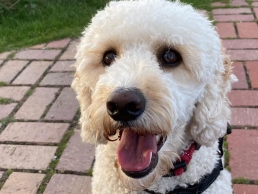
Coucou everyone, I’m Ellie, a 2-year-old cockapoo and Official Co-Worker of MFL Mentoring’s Project Director, Lucy Jenkins.
She is more fondly known to me as ‘Servant’ but I’m not really sure that she likes that; she’ll probably be cross that I shared that with you, but never mind. I have more important things to share with you which are my big dreams of becoming the social media star of MFL Mentoring because sometimes people forget that we dogs speak languages too and I need to tell everyone about it!
But a little about me first. My pronouns are she/her and I’m a medium sized dog with white-ish (depending on how muddy the walk was) curly hair. I’m a teenager now so I like to sleep a lot. My family sometimes call me lazy which I think is unfair. Haven’t they read the research on how teenagers need extra sleep?!
I’m going to leave a reference to this fascinating research at the end of my blog for any doubters! My favourite things to do other than snooze, are to go to the beach, play with my tennis ball and to drink sea water from the rock pools – I know this is not super healthy for me, but it’s just so tasty. I also really love food – a lot!
So to get started, I actually wanted to tell you about the many names that my humans call me – Ellie Wellie, Eleanor Wellington, the Right Honourable Dame Eleanor Wellington, Ellie Wellie Boots and Evil Ellie. I’m not sure why they think it’s appropriate to call me so many different names, but they keep on doing it, and it actually got me thinking….
When they are happy with me, they call me Ellie Wellie Boots, but when they are cross, they call me Evil Ellie. They think I don’t understand the difference, but I know because they say ‘Evil Ellie’ with cross voices and ‘Ellie Wellie Boots’ with smiles and cuteness. It occurred to me that they use lots of different words (and these are just the English ones) to refer to me – but how does it work to have so many names when I am just one dog!?
Have you ever thought about the many different names you call your pets? Or maybe your friends? Or siblings? Or Aunt or cousins? Have you ever thought about why you do that, or what it suggests about your feelings towards something or someone when you use those words?
Take the word for dog as an example: dog, pup, puppy, pooch, doggo, hound, scruff bag, mutt, fleabag… one ‘thing’and yet, so many words. Language is key. What image comes to your brain when I say ‘pooch’? Is it different from ‘hound’? Why?
We’ll leave it there for now but I want you think about it and let me know the many names you call your pet or people over on Twitter/Instagram – join me there!
Until next time….
Ellie Wellie Boots
Don't get caught red-handed!

I feel like I’ve spent half my life on trains recently, but that’s not such a bad thing. While waiting for trains and dealing with delays, every so often something will catch my attention and give me some blog-spiration!
Today is no different; I’m writing because a sign between platforms warning passengers of the risks of travelling without a ticket caught my attention: “don’t get caught red-handed!”, it read. I knew that to be caught “red-handed” meant “caught doing something wrong”, i.e. breaking the law. However, I had no idea where the phrase came from. So, I decided to do some research!
It turns out we’ve been using this expression* for centuries! “Red handed” was first used in Scotland in 1432, when an early version of the saying – “red hand” – was recorded in Scottish King James I’s Acts of Parliament*. This phrase was used a lot in court cases to talk about criminals being caught with blood on their hands after committing murder! Maybe I shouldn’t be surprised at the gruesome* origins of this phrase – after all, why else would someone’s hands be bright red? Unless they’ve been chopping beetroot, that is!
However, it wasn’t until 1819 that the saying “red-handed” was coined* by Scottish historian* and novelist Sir Walter Scott in his book Ivanhoe. As lots of people read Scott’s books, the phrase “red-handed” became common, and this is probably why we still use it today.
So, are there any similar sayings in other languages? In Italian you might say that someone is caught “con le mani nel sacco”, which translates as “with your hands in the bag”. As you may have guessed, this saying refers to stealing something – so slightly less serious than murder!
You may have heard a similar phrase in American English, being caught “with your hands in the cookie jar”. However, the American version usually refers to people stealing from their employers*.

The Portuguese versions of “red-handed”, “com a boca na botija” and “com a boca na torneira”, meaning “with your mouth on the bottle” or “with your mouth at the faucet*”, most likely refer to people being caught drinking stolen wine. However, these expressions were usually spoken between friends and family rather than written down in official documents, so it’s unclear when they were first used or where they came from.
Unsurprisingly, I couldn’t find any similar sayings in other languages with as much of a bloodthirsty background as the English (or rather Scottish) “red-handed”. I wonder if the train companies thought about the history of the phrase when designing the sign…
Is there anything I’ve missed? Get in touch and let us know how to say “red-handed” in any other languages you know!
Words
*expression = word/phrase
*Acts of Parliament = a document where laws were written
*gruesome = causing horror
*coined = first used
*historian = a person who studies/writes about events in the past
*employer = the person or organisation a person works for
*faucet = a tap
School Profile: Cefn Saeson Comprehensive
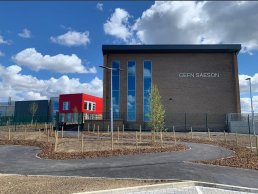
Cefn Saeson Comprehensive, Rebecca Steele
Medium: English
Location: Neath
International Languages: Spanish, French
Hi all,
How times have changed! Language learning looks so different in schools nowadays compared to when I was in school. It’s not just about words and grammar anymore (although they’re still very important!), it’s all about becoming more in-tune with the wonderful world of culture and multilingualism these days, which makes perfect sense seeing as we are so closely connected to people across the world now!
Our department take much pride in promoting multilingualism at our school. Many of our learners are speakers or learners of multiple languages and we love to hear them talking about the languages they use. The new CfW allows us to draw on this and help our learners to view language as part of their identity. It’s always a magical moment when a learner is able to link the language being learnt and a language they already know, through cognates for example. I remember setting a piece of cover work (thanks flu season!) for my learners to fill in a class map of how they might ‘link’ to other countries (e.g. do they speak their language, have relatives from there, have a favourite food come from there, and so on). When I came back my mind was blown to see how many learners could link to other countries, I couldn’t see any blank maps anywhere! This was just as eye-opening to me as it was to them! Our department also offers an extra-curricular Italian language club, which is proving very popular with learners, and they have been able to see similarities between the languages taught here at our school and Italian. Another teacher in our school has launched a Japanese culture club too, which is going down a storm. These initiatives are getting the learners so excited about language and culture, so much so that I’ve had learners asking me to run other clubs for all kinds of languages (here I come Duolingo!)
Another thing I love about the new curriculum is the chance it gives us to step outside our subject bubbles and think in a wider context. I’ve been preparing our new booklet for our year 7 cohort and thinking about the opportunities I could give them to develop the 4 purposes. Learners will be looking at pencil cases and colours and, at first, I was at a total loss as to how I could deliver this in a way to develop ethical, healthy, ambitious, and creative learners. Luckily, I stumbled across a wonderful charity who make school bags for learners in need outside of the UK. Since then, I’ve been working on using this for the new topic, allowing learners to design their ‘perfect’ school bag, so that we can narrow down a list of items to send to the charity. Thanks to the CfW not only can we now work with outside agencies such as this wonderful charity, but we are also encouraged to work with other departments. I’ve been thinking of getting the learners to create a piece of art using words for colours to depict an image – this style of art can then be looked at further in the art department’s lessons. I can’t wait to see what our budding Picassos come up with!
And that’s me signing off!


